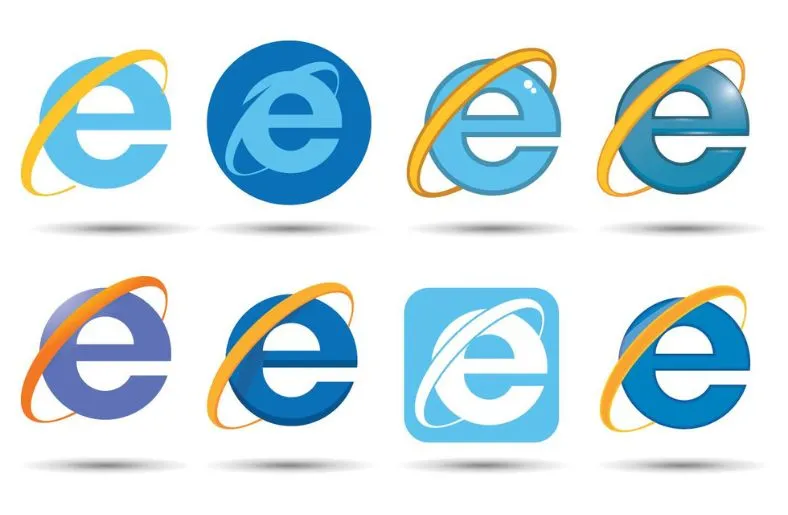Within the constantly changing world of internet browsing Internet Explorer Online represents a significant change in its approach to web compatibility and security. Internet Explorer, one of the original browsers that influenced the early Internet, has made a lasting impact on digital history with its strong focus on security and compatibility in various web settings.
Internet Explorer Online emphasizes guaranteeing strong security measures while also supporting old systems and current web standards. It has a strong reputation for innovation and reliability, that make sure that users online experience is safe from security risks and still works with a variety of websites and apps. This browser offers the performance and stability users require, whether they are browsing the newest or using oldest platforms.
Internet Explorer Online, an essential component of Internet browsing for several decades, has security features that guard your private data and defend against online attacks as a top priority. The strong security measures in this browser are made to reduce threats without sacrificing functionality, giving users a trustworthy barrier when using the internet.
This guide provides a thorough look at Internet Explorer online, its significance in web browsing, security features, compatibility with web standards, user experience and accessibility impact, and the future of Internet Explorer.
Understanding Internet Explorer Online
Microsoft developed Internet Explorer and it has been an important part of web browsing since it was first launched in 1995. During its development stage, it has gone through several updates, with each version always trying to improve the browsing experience and meet the evolving internet environment. Internet Explorer has been crucial in influencing how users engage with the internet, introducing features such as tabbed browsing and ActiveX controls in early versions and later emphasizing security improvements and compatibility with contemporary web standards.
During the phase of late 1990s and early 2000s, Internet Explorer was one of the leading browser which was holding a large portion of the market in comparison to its rivals such as Netscape Navigator. Internet Explorer 6.0 once became the most popular but has also received some backlash for security flaws when it was released in 2001.
Internet Explorer Online is an important part of web browsing history, known for its innovative features, security issues, and continuous development. Despite a decrease in the popularity of Internet Explorer, it keeps on impacting browser security and compatibility as well as the development of online technologies, even despite the threat of the arrival of more recent browsers such as Microsoft Edge.
Importance of Internet Explorer Online in Web Browsing
Internet Explorer plays an important role in shaping the development of web surfing. Despite of decrease in the popularity of Internet Explorer in the past few years, Internet Explorer’s historical importance remains significant for multiple important reasons. They are:
- Early Market Dominance: Internet Explorer has achieved a strong presence in the market which comes bundled with the Windows operating system in turn establishing itself as one of the leading web browsers.
- Standardization of Web Practices: Internet Explorer’s popularity resulted in the creation of unofficial standards in web development. To work well with Internet Explorer’s rendering engine there were numerous websites and apps were created.
- Innovations in technology: Some of the functionalities that were set with the standard of the industry, such as tabbed browsing in later versions, support for Cascading Style Sheets (CSS), and the incorporation of ActiveX controls for interactive content.
- Enhancements to the User Interface: Set guidelines for the user interface of web browsers by including multimedia elements, integrated search functions, and toolbars that can be customized.
- Compatibility with Enterprise Systems: It has become the preferred browser for numerous organizations due to its smooth interface with corporate applications and systems, which promotes productivity and uninterrupted operations.
- Legacy Support and Compatibility Modes: Legacy support and compatibility modes have been developed and implemented to guarantee that older websites and applications continue to function properly, facilitating the migration of organizations and developers to newer versions.
- Security Challenges and Enhancements: After Microsoft came under scrutiny for security flaws, better security measures such as frequent updates, patches, phishing filters, and privacy settings were put in place.
- Continuing Influence Despite Decline: Internet Explorer continues to have an extremely significant effect on web development standards and practices, even though its usage has been decreasing as a result of the introduction of newer browsers like Microsoft Edge.
- Enterprise Reliability: Because of Internet Explorer’s ongoing support and compatibility, numerous organizations continue to depend on it for obsolete applications and systems.
Security features in Internet Explorer online
Internet Explorer has incorporated numerous security measures across its different versions to safeguard users against online risks. Below are a few of the main security attributes found in Internet Explorer:
- Phishing Filter: Internet Explorer comes with features that are built-in to detect and alert users about phishing websites. Phishing filters help to examine the website features and to check them with a database of known phishing websites.
- Enhanced Protected Mode (EPM): EPM was first introduced in Internet Explorer 10 and its later versions which in turn boost the browser security by operating the browser in a low-integrity sandbox. This restricts the browser’s access to the operating system, which boosts the difficulties for malicious programs to take advantage of flaws.
- SmartScreen Filter: Internet Explorer with the help of SmartScreen Filter serves to protect against malware and harmful downloads. It also verifies the trustworthiness of websites and files to safeguard users from potential dangers.
- Security Zones: Internet, Local intranet, Trusted sites, and Restricted sites are some of the security zones that are divided into Internet Explorer for websites with some unique security configurations. Depending on the trustworthiness of the websites the user’s access will in turn enable them to personalize their security preferences.
- Cross-Site Scripting (XSS) Filter: An integrated XSS filter is equipped in Internet Explorer which aids in thwarting cross-site scripting attacks. It looks throughout web pages’ script content and eliminates or deactivates any programs that can be harmful.
Internet Explorer compatibility with web standards
In the past, Internet Explorer has been known to have a varied reputation when it comes to adhering to web standards. Here is a summary of how Internet Explorer has dealt with compatibility with web standards across different releases:
- Initial Releases (Internet Explorer 6 through Internet Explorer 8):
CSS Support: CSS2 is only partially supported, causing differences in how web pages are displayed compared to other browsers.
HTML Support: Basic HTML standards are supported, but there may be occasional rendering problems, particularly with newer HTML elements and attributes.
Quirks Mode: Quirks Mode was created to ensure older websites still work, even if it means not strictly following web standards. - Upgrade from Internet Explorer version 9 to version 11:
progress: Major enhancements in meeting standards, especially to CSS3 and HTML5.
CSS3 Support: Improved CSS3 support including better compatibility with features like gradients, shadows, and transitions.
Improved HTML5 support: Enhancements for HTML5 elements and attributes, increasing compatibility with contemporary web applications.
Compatibility View: Compatibility View is a function implemented to display older websites created for earlier versions of IE correctly. - EdgeHTML and Microsoft Edge are closely connected:
Change: Windows 10 saw the debut of Microsoft Edge, powered by the EdgeHTML rendering engine before being swapped out for a Chromium-based engine.
Enhanced Standards Compatibility: EdgeHTML now offers better support for modern web standards such as improved CSS3, HTML5, and JavaScript support.
Improved Performance: Emphasis on quickness and effectiveness, decreasing processing times, and enhancing the overall internet navigation. - Continued maintenance and assistance for older systems:
Ongoing support: Ongoing support for IE remains in place due to its compatibility with older applications and internal websites, despite the transition to Edge.
Document Modes: Document Modes is a function in Internet Explorer that allows for continued support of certain versions, ensuring proper operation of older websites and applications.
Internet explorer impact on user experience and accessibility
Both in the past and the present, Internet Explorer has had an important impact on accessibility and user experience:
- Compatibility issues: Internet Explorer is infamous for supporting web standards inconsistently. Because of Internet Explorer’s peculiarities, developers frequently had to make several versions of websites, which resulted in fragmented user experiences. This meant that, in comparison to other browsers, users of Internet Explorer frequently came across websites that either needed to be fixed or looked at differently.
- Performance problems: Internet Explorer has historically come under fire for outperforming its rivals in terms of rendering speed and general performance. Dissatisfaction can be caused by the experience of delays or sluggishness during browsing.
- Security issues: Internet Explorer has always been subject to security flaws because of its frequent usage and close connection with the Windows operating system. Users were at risk because they had become more susceptible to malicious software, phishing attacks, and other online hazards than users of more secure browsers.
- Accessibility support: The accessibility features of Internet Explorer have not always been as good as those of other browsers. Internet Explorer may provide several challenges for users who always rely on assistive technologies like voice control or screen readers at the time of accessing and interacting with online material.
- Impact on innovation: The gradual adoption of contemporary web standards and functionality by Internet Explorer also hindered the advancement of web development innovation. Developers typically had to delay the deployment of cutting-edge technologies to retain compatibility with Internet Explorer, which could have reduced the experience for users of other browsers.
- End of support: Microsoft terminated an era in June 2022 when it was announced that Internet Explorer would no longer get support. Because of this, companies and users have started switching to more recent browser versions, which usually provide improved security, performance, and compatibility with contemporary web standards.
You can also leverage the LambdaTest platform to test on Internet Explorer online to ensure security and compatibility. Developers and quality assurance personnel may test their applications across a variety of Internet Explorer versions using LambdaTest, a cloud-based platform that supports testing applications on Internet Explorer as well as microsoft edge online. When it comes to ensuring the compatibility and security of web-based apps, there are numerous advantages to utilizing LambdaTest for Internet Explorer online testing or Microsoft edge online.
LambdaTest is an AI-driven platform for test execution and orchestration. It is a cloud-based testing platform that offers real and virtual device cloud for real-time browser and app testing. It allows testers to perform both web and mobile app testing manually and automated by providing access to more than 3000 environments, real devices, and browsers online. It is an online device farm with all the operating system combinations available. Debugging, real-time testing, and visual regression testing are a few of its fascinating capabilities for testing mobile apps.
When testing web applications on Internet Explorer online or Microsoft edge online, LambdaTest provides a reliable way to meet security and compatibility requirements. With the help of its cloud-based platform, teams can efficiently address the varied needs of their user base by optimizing testing procedures, improving application reliability, and delivering a smooth user experience across all Internet Explorer versions or the new Microsoft Edge online.
Read More > Sherry Guidry Device Technologies
Conclusion
To sum up, Internet Explorer Online is dedicated to making sure that it is compatible and secure in the ever-changing online world of today. Regular upgrades and sophisticated policies are put in place with a laser-like focus on security to shield users from ever-evolving cyber threats. Internet Explorer Online strives to provide users with a safe and reliable browsing experience by being watchful and proactive.
By working together, Internet Explorer Online can maintain its reputation as a dependable and trustworthy browser choice while simultaneously prioritizing user safety and happiness. Future developments in security protocols and compatibility improvements will bolster Internet Explorer Online’s standing in the digital environment and offer consumers a stable and dependable surfing experience.




